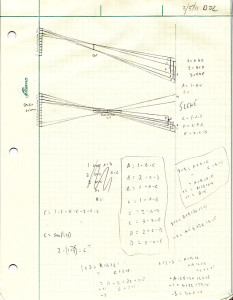I invented many common & important technologies
April 15th, 2013
Did you know I invented many of the key technologies used to drive today’s world?
It’s true – I did. All by myself. I ran across this yesterday:
It’s a 2011 scribble from when I was inventing deconvolution.
In fact I’ve invented so many common technologies that I’ve forgotten about most of them. A few that I do remember are:
| Technology | Concept | Implementation | Notes |
|---|---|---|---|
| Dither | ~1974 | – | As a child playing with circuits. |
| FIFO queues | 1978 | 1978 | I called them “circular buffers”; never heard of terms “FIFO” or “queue”. |
| Remote Desktop[1] | ~1980 | – | I was going to do it for the TRS-80 (Models I and III) and call it “Guest/Host”. |
| Web prefetch | ~1984 | – | Well, prefetch for web-like services, anyway. Pre-fetch the results from each of the 6 or so menu options on CompuServe Information Service (CIS), to save download time on your 300 bps modem. |
| Key splitting | ~1990 | – | Split a key into N parts, of which M (M <= N) are needed to use the key. |
| Google Earth | 1990 | 1991 | I started a company to do it. We were going to use CD-ROMs, because they hold so much data. Sigh. |
| Internet-controlled thermostat | 1997 | – | From my notes: “Thermostat with Internet interface so you can remotely set and test (and read history?) via Internet (or POTS); for travelers.” |
| Superresolution | ~1999 | – | Motivated by early digicams with lenses that could resolve more detail than the sensors of the time. |
| Deconvolution | ~1999 | 2011 | For lensless imaging. Dropped it when I discovered it required far more bits of ADC than available in real sensors (or even real photons). |
| Camera orientation sensor | ~2001 | – | Gravity sensor in digital camera detects if it’s being held in landscape or portrait orientation, then sets a bit in the image to display it properly. |
Of course, I don’t claim to have been the first to invent any of these things.
The astute reader will note that all these invention dates are all long after these technologies were already well-known. That’s because I re-invented them independently (having never heard of them). The chance to do that is one of the perks of having little formal education.
I’ve often thought that more than 99% of what any individual learns during a lifetime is lost when they die – only the tiny fraction of 1% that gets written down, successfully taught, or copied, benefits anyone else. It’s a terrible waste.
And this shows that even for that tiny fraction of 1% that is written down, many people (perhaps most?) end up having to re-discover it from scratch, either because that’s easier than understanding someone else’s explanation, or because it’s too hard to find out that someone else already has solved the problem.
Makes you think a bit about the meaning of “obvious at the time the invention was made to a person having ordinary skill in the art“, doesn’t it?
[1] I did have a little bit to do with inventing RDP (the first invention, that is), but that wasn’t till the 1990s…

April 16th, 2013 at 1:34 am
Watching my daughter in school, I’m struck by how much time is consumed in just bringing a new person up-to-speed on the human knowledge base. And as you described, the job isn’t done even when we reach adulthood.
If only all the knowledge could be quickly downloaded into the brain, we could waste less time learning old stuff and spend more time developing new stuff. Maybe that’s how the Borg got started.